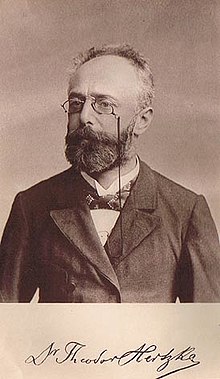| Revision as of 23:34, 7 April 2014 editSrich32977 (talk | contribs)Autopatrolled, Extended confirmed users, New page reviewers, Pending changes reviewers, Rollbackers300,253 editsm Cleaned up using AutoEd← Previous edit | Revision as of 14:29, 30 May 2014 edit undo216.188.231.53 (talk) →External linksNext edit → | ||
| Line 39: | Line 39: | ||
| ==External links== | ==External links== | ||
| * Ulrich E Bach, “Seeking Emptiness: Theodor Hertzka’s Colonial Utopia Freiland (1890)” In: Utopian Studies 22.1 (2011): 74-90. | |||
| * {{gutenberg author}} | * {{gutenberg author}} | ||
Revision as of 14:29, 30 May 2014
| Theodor Hertzka | |
|---|---|
 | |
| Born | (1845-07-13)July 13, 1845 Budapest, Hungary |
| Died | October 22, 1924(1924-10-22) (aged 79) Wiesbaden, Germany |
| Nationality | Hungarian-Austrian |
| Academic career | |
| Field | Monetary theory |
| School or tradition | Freiwirtschaft |
Theodor Hertzka, or Hertzka Tivadar (July 13, 1845, Budapest – October 22, 1924, Wiesbaden) was a Jewish-Hungarian-Austrian economist and journalist.
Life
He studied at the universities of Vienna and Budapest, and in 1872 became a member of the editorial staff of the Neue Freie Presse of Vienna. In 1879 he founded the newspaper Wiener Allgemeine Zeitung, which he edited until 1886. He was a friend of Johannes Brahms.
Hertzka has been called the "Austrian Bellamy", because his novel Freiland, ein soziales Zukunftsbild (Leipzig, 1890), had a similar theme to that of Edward Bellamy's novel Looking Backward.
Bibliography
Other works by Hertzka are:
- Die Mängel des österreichischen Aktiengesetzentwurfs, Vienna, 1875;
- Das Wesen des Geldes, Leipzig, 1887
(in which he recommended the introduction of the gold standard in Austria); - Die Gesetze der Handelspolitik, ib. 1880;
- Das Personenporto: Ein Vorschlag zur Durchführung eines billigen Einheitstarifs im Personenverkehr der Eisenbahnen, Vienna, 1885;
- Die Gesetze der sozialen Entwickelung, Leipzig, 1886;
- Freiland – ein soziales Zukunftsbild Leipzig, 1890;
- Wechselkurs und Agio, Vienna, 1894
References
 This article incorporates text from a publication now in the public domain: Isidore Singer (1901–1906). "Theodor Hertka". In Singer, Isidore; et al. (eds.). The Jewish Encyclopedia. New York: Funk & Wagnalls.
This article incorporates text from a publication now in the public domain: Isidore Singer (1901–1906). "Theodor Hertka". In Singer, Isidore; et al. (eds.). The Jewish Encyclopedia. New York: Funk & Wagnalls.
External links
- Ulrich E Bach, “Seeking Emptiness: Theodor Hertzka’s Colonial Utopia Freiland (1890)” In: Utopian Studies 22.1 (2011): 74-90.
- Works by Theodor Hertzka at Project Gutenberg
